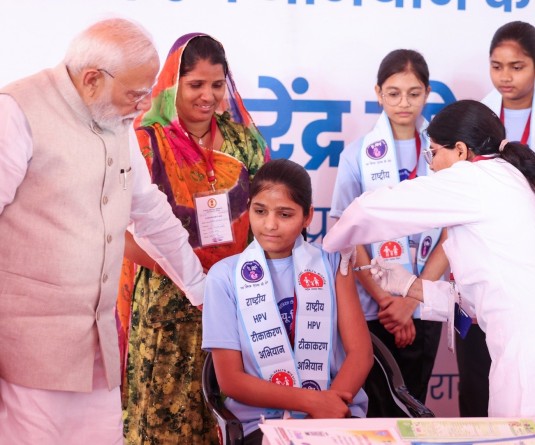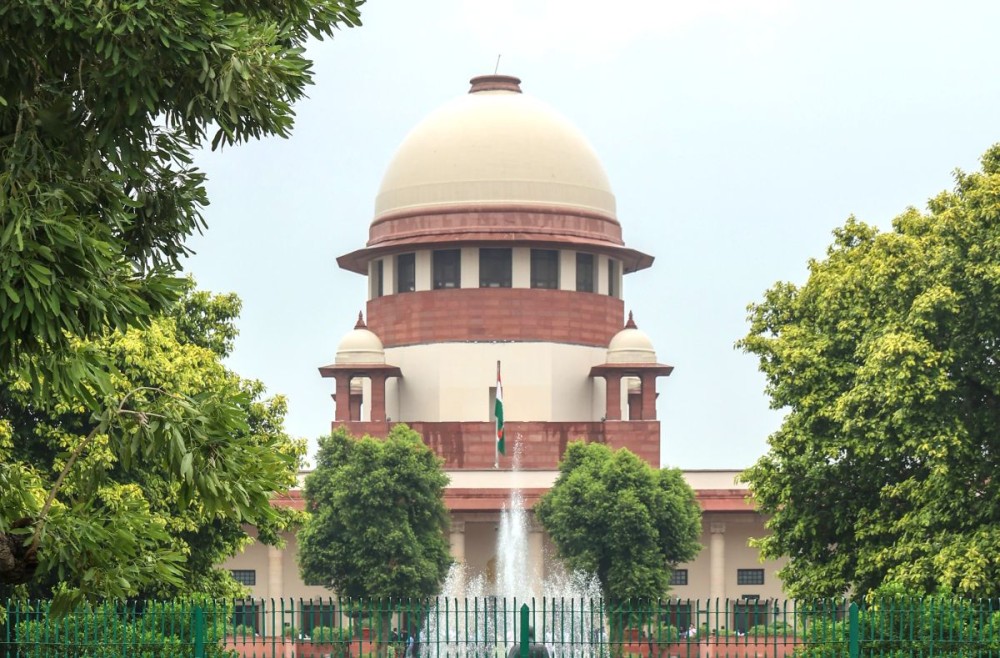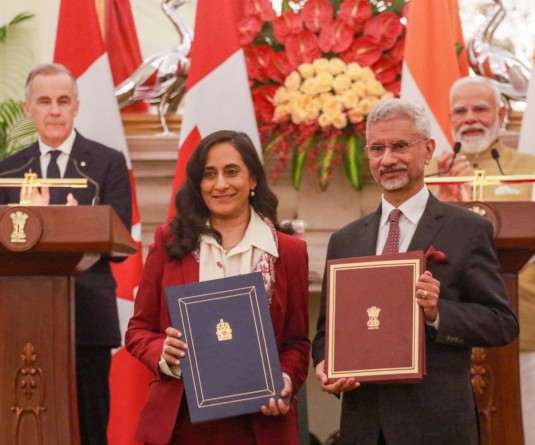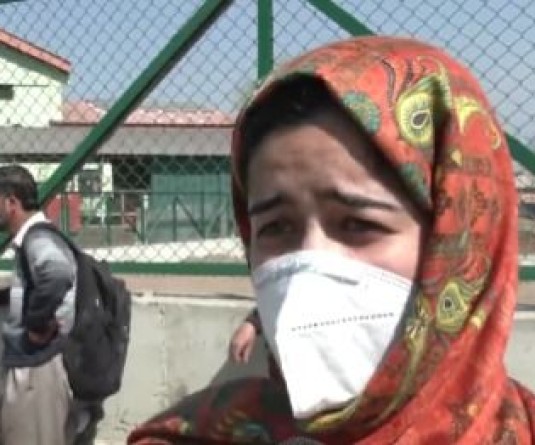
In this courtroom sketch, Chicago businessman Tahawwur Rana is shown in federal court as the prosecutor makes an opening argument Monday, May 23, 2011, in Chicago. (AP Photo)
CHICAGO, June 10 (AP): A federal jury convicted a Chicago businessman on Thursday of helping plot an attack against a Danish newspaper that printed cartoons of the Prophet Muhammad but cleared him of the most serious terrorism charge accusing him of cooperating in the deadly 2008 rampage in Mumbai.
The jury reached its split verdict after two days of deliberations, finding Tahawwur Rana guilty of providing material support to terrorism in Denmark and to the Pakistani militant group that had claimed responsibility for the three-day siege in India’s largest city that left more than 160 people dead, including six Americans.
The jurors, who were not identified in court, declined to talk to the media to explain their decision, which defense attorneys described as conflicting. Rana, a Canadian national who has lived in Chicago for years, faces up to 30 years in prison on the two charges. “We’re extremely disappointed. We think they got it wrong,” defense attorney Patrick Blegen told reporters.
At the center of the trial was testimony by the government’s star witness, David Coleman Headley, Rana’s longtime friend who previously pleaded guilty to laying the groundwork for the Mumbai attacks and planning to attack the Danish paper in retaliation for printing the cartoons that had angered many Muslims because pictures of the prophet are prohibited in Islam. That plot was never carried out.
Headley’s testimony was closely watched worldwide because it provided a rare glimpse into the inner workings of the Pakistani militant group Lashkar-e-Taiba, which took credit for the Mumbai attacks, and the alleged cooperation with Pakistan’s top intelligence agency known as the ISI. The trial started just weeks after Navy SEALs found Osama bin Laden hiding outside Islamabad, raising concerns that Pakistan may have been protecting the world’s most wanted terrorist.
The Pakistani government has denied the allegations and maintained it did not know about bin Laden or help plan the Mumbai attacks. Ujjawal Nikam, the special public prosecutor in the Mumbai attack trial in India, said he was disappointed with the verdict. “When Rana has been held guilty of assisting the Lashkar-e-Taiba and guilty of supporting terrorist acts in Denmark how have they separated him from the Mumbai attacks?” he said. “It appears that there are some apparent contradictions in this verdict.”
India’s internal security chief U.K. Bansal told reporters that the verdict shouldn’t be a setback for the case in India. “The judicial systems in both countries are different. We will be presenting our evidence before our own courts,” Bansal said. Defense attorneys spent much of their time trying to discredit Headley, who they claim duped his friend from a Pakistani boarding school. They attacked Headley’s character, saying he initially lied to the FBI, lied to a judge and even lied to his own family. They claimed he implicated Rana in the plot because he wanted to make a deal with prosecutors, something he’d learned after he became an informant for the U.S. Drug Enforcement Administration after 2 heroin convictions.
But prosecutors claimed Rana, 50, knew exactly what he was doing when he helped Headley. Rana, who did not testify, was on trial for allegedly allowing Headley to open a branch of his Chicago-based immigration law services business in Mumbai as a cover story while Headley conducted surveillance ahead of the November 2008 attacks. He was also accused of letting Headley, whose cooperation means he avoids the death penalty and extradition, travel as a representative of the company in Copenhagen.
Prosecutors made a Sept. 7, 2009, recorded phone call between Rana and Headley the centerpiece of their evidence against Rana. In the call, the men discussed the Mumbai attacks and Headley talked about future targets, including the Danish newspaper Jyllands-Posten. Prosecutors also questioned the validity of Rana wanting to open a branch of his office in Denmark and sending Headley to the Copenhagen newspaper’s office simply to inquire about advertising, which could have been done via email or telephone.
U.S. Attorney Patrick Fitzgerald told reporters after the verdict that he was gratified by the jury’s decision and disagreed with defense attorneys who said the verdict was conflicting because he was convicted of supporting Lashkar-e-Taiba but acquitted of charges that he helped in the Mumbai attacks. “There’s lots of ways you could explain it, but I haven’t spoken to the jury,” Fitzgerald said. “There was clearly evidence that he knew he was working with Lashkar.”
In court, prosecutors played clips of Rana’s post-arrest statement to the FBI, where he said that he knew Headley had trained with Lashkar, which the U.S. has declared a terrorist organization. It was also clear from the recording that Rana was at least aware of the others allegedly involved in the Danish plot. Six others were charged in absentia in the case, including an ISI member known only as “Major Iqbal” and Headley’s Lashkar handler Sajid Mir. According to Headley’s testimony, Lashkar was initially involved in planning the Danish plot. But after the Mumbai attacks, the group decided to lay low, according to Headley, who said he proceeded to work with another militant group.
While much of Headley’s testimony had been heard before — both through the indictment and a report released by the Indian government last year — he did reveal a few new details. Among them was that another militant leader Ilyas Kashmiri, who U.S. officials believed to be al-Qaida’s military operations chief in Pakistan, had plotted to attack U.S. defense contractor Lockheed Martin. Kashmiri was reported killed on June 3 by U.S. drone attacks inside Pakistan. While U.S. officials haven’t confirmed the death, Pakistani officials say they’re certain Kashmiri is dead.
Headley said he worked with Kashmiri in the plot against the Danish paper, describing how the militant wanted a “stronghold approach.” One plan including taking hostages in the building and killing them quickly by beheading them. “He said we should throw out the heads of the hostages from the windows,” Headley said of Kashmiri, speaking in a monotone and seemingly detached voice. “He said shoot them first and then behead them later, so there wouldn’t be a struggle.”
The jury reached its split verdict after two days of deliberations, finding Tahawwur Rana guilty of providing material support to terrorism in Denmark and to the Pakistani militant group that had claimed responsibility for the three-day siege in India’s largest city that left more than 160 people dead, including six Americans.
The jurors, who were not identified in court, declined to talk to the media to explain their decision, which defense attorneys described as conflicting. Rana, a Canadian national who has lived in Chicago for years, faces up to 30 years in prison on the two charges. “We’re extremely disappointed. We think they got it wrong,” defense attorney Patrick Blegen told reporters.
At the center of the trial was testimony by the government’s star witness, David Coleman Headley, Rana’s longtime friend who previously pleaded guilty to laying the groundwork for the Mumbai attacks and planning to attack the Danish paper in retaliation for printing the cartoons that had angered many Muslims because pictures of the prophet are prohibited in Islam. That plot was never carried out.
Headley’s testimony was closely watched worldwide because it provided a rare glimpse into the inner workings of the Pakistani militant group Lashkar-e-Taiba, which took credit for the Mumbai attacks, and the alleged cooperation with Pakistan’s top intelligence agency known as the ISI. The trial started just weeks after Navy SEALs found Osama bin Laden hiding outside Islamabad, raising concerns that Pakistan may have been protecting the world’s most wanted terrorist.
The Pakistani government has denied the allegations and maintained it did not know about bin Laden or help plan the Mumbai attacks. Ujjawal Nikam, the special public prosecutor in the Mumbai attack trial in India, said he was disappointed with the verdict. “When Rana has been held guilty of assisting the Lashkar-e-Taiba and guilty of supporting terrorist acts in Denmark how have they separated him from the Mumbai attacks?” he said. “It appears that there are some apparent contradictions in this verdict.”
India’s internal security chief U.K. Bansal told reporters that the verdict shouldn’t be a setback for the case in India. “The judicial systems in both countries are different. We will be presenting our evidence before our own courts,” Bansal said. Defense attorneys spent much of their time trying to discredit Headley, who they claim duped his friend from a Pakistani boarding school. They attacked Headley’s character, saying he initially lied to the FBI, lied to a judge and even lied to his own family. They claimed he implicated Rana in the plot because he wanted to make a deal with prosecutors, something he’d learned after he became an informant for the U.S. Drug Enforcement Administration after 2 heroin convictions.
But prosecutors claimed Rana, 50, knew exactly what he was doing when he helped Headley. Rana, who did not testify, was on trial for allegedly allowing Headley to open a branch of his Chicago-based immigration law services business in Mumbai as a cover story while Headley conducted surveillance ahead of the November 2008 attacks. He was also accused of letting Headley, whose cooperation means he avoids the death penalty and extradition, travel as a representative of the company in Copenhagen.
Prosecutors made a Sept. 7, 2009, recorded phone call between Rana and Headley the centerpiece of their evidence against Rana. In the call, the men discussed the Mumbai attacks and Headley talked about future targets, including the Danish newspaper Jyllands-Posten. Prosecutors also questioned the validity of Rana wanting to open a branch of his office in Denmark and sending Headley to the Copenhagen newspaper’s office simply to inquire about advertising, which could have been done via email or telephone.
U.S. Attorney Patrick Fitzgerald told reporters after the verdict that he was gratified by the jury’s decision and disagreed with defense attorneys who said the verdict was conflicting because he was convicted of supporting Lashkar-e-Taiba but acquitted of charges that he helped in the Mumbai attacks. “There’s lots of ways you could explain it, but I haven’t spoken to the jury,” Fitzgerald said. “There was clearly evidence that he knew he was working with Lashkar.”
In court, prosecutors played clips of Rana’s post-arrest statement to the FBI, where he said that he knew Headley had trained with Lashkar, which the U.S. has declared a terrorist organization. It was also clear from the recording that Rana was at least aware of the others allegedly involved in the Danish plot. Six others were charged in absentia in the case, including an ISI member known only as “Major Iqbal” and Headley’s Lashkar handler Sajid Mir. According to Headley’s testimony, Lashkar was initially involved in planning the Danish plot. But after the Mumbai attacks, the group decided to lay low, according to Headley, who said he proceeded to work with another militant group.
While much of Headley’s testimony had been heard before — both through the indictment and a report released by the Indian government last year — he did reveal a few new details. Among them was that another militant leader Ilyas Kashmiri, who U.S. officials believed to be al-Qaida’s military operations chief in Pakistan, had plotted to attack U.S. defense contractor Lockheed Martin. Kashmiri was reported killed on June 3 by U.S. drone attacks inside Pakistan. While U.S. officials haven’t confirmed the death, Pakistani officials say they’re certain Kashmiri is dead.
Headley said he worked with Kashmiri in the plot against the Danish paper, describing how the militant wanted a “stronghold approach.” One plan including taking hostages in the building and killing them quickly by beheading them. “He said we should throw out the heads of the hostages from the windows,” Headley said of Kashmiri, speaking in a monotone and seemingly detached voice. “He said shoot them first and then behead them later, so there wouldn’t be a struggle.”
India ‘disappointed’ over Rana’s acquittal
New Delhi, June 10 (PTI): Government on Friday expressed “disappointment” over Tahawwur Hussain Rana’s acquittal by a US court on charges of plotting the Mumbai attacks and said it will soon take a decision on filing a charge sheet against him and LeT operative David Headley in an Indian court.
“We are disappointed that Rana was acquitted on the count of conspiracy to provide material support to the Mumbai terrorist attacks,” Secretary, Internal Security in the Ministry of Home Affairs, U K Bansal, said in a statement. Mr. Bansal said the government has taken note of the verdict pronounced by a US District Court in the Rana case following the finding by the jury that the Pakistani-Canadian was guilty on two of the three counts.
Rana has been found guilty on one count of ‘conspiracy to provide material support to the terrorism plot in Denmark’ and the other of ‘providing material sup port to LeT’. The jury acquitted Rana of conspiracy to provide material support to the Mumbai terror attacks. Mr. Bansal said the National Investigation Agency (NIA), which is probing the case against Headley, Rana and others, had decided to wait for proceedings to conclude in the US court before filing a charge sheet in an Indian court against the accused.
The NIA has also sought certain documents and evidence that were produced in the Chicago court and expects to receive them. “After examining the verdict in the US court and after reviewing the documents and evidence that it expects to receive, NIA will take a decision on filing a charge sheet against Headley, Rana and others in an Indian court,” he said. Prosecution in the US had produced in the court evidence to show that “Headley had advised Rana of his assignment to scout potential targets in India,” Mr. Bansal said.
Headley obtained Rana’s consent to open an office of First World Immigration Services as a cover for his activities and Rana advised Headley on how to obtain a visa for travel to India. “Headley and Rana had reviewed how Headley had done surveillance of the targets that were attacked in Mumbai. Evidence was also produced that Rana told Headley that the terrorists involved in Mumbai attacks should receive Pakistan’s highest military honours posthumously,” he said.
Mr. Bansal said one must remember that Rana was tried in a U.S. court in accordance with the U.S. law. Criminal trials in the US are jury trials and there are special rules governing such jury trials. “While Rana’s lawyers have stated that they will file an appeal against the verdict, it is not yet clear whether the U.S. authorities would also file an appeal against the acquittal on one count of conspiracy,” he said. Bansal’s statement came hours after he said that Rana’s acquittal was not a setback as India does not rely overtly on prosecution of terror suspects in other countries.
“We are disappointed that Rana was acquitted on the count of conspiracy to provide material support to the Mumbai terrorist attacks,” Secretary, Internal Security in the Ministry of Home Affairs, U K Bansal, said in a statement. Mr. Bansal said the government has taken note of the verdict pronounced by a US District Court in the Rana case following the finding by the jury that the Pakistani-Canadian was guilty on two of the three counts.
Rana has been found guilty on one count of ‘conspiracy to provide material support to the terrorism plot in Denmark’ and the other of ‘providing material sup port to LeT’. The jury acquitted Rana of conspiracy to provide material support to the Mumbai terror attacks. Mr. Bansal said the National Investigation Agency (NIA), which is probing the case against Headley, Rana and others, had decided to wait for proceedings to conclude in the US court before filing a charge sheet in an Indian court against the accused.
The NIA has also sought certain documents and evidence that were produced in the Chicago court and expects to receive them. “After examining the verdict in the US court and after reviewing the documents and evidence that it expects to receive, NIA will take a decision on filing a charge sheet against Headley, Rana and others in an Indian court,” he said. Prosecution in the US had produced in the court evidence to show that “Headley had advised Rana of his assignment to scout potential targets in India,” Mr. Bansal said.
Headley obtained Rana’s consent to open an office of First World Immigration Services as a cover for his activities and Rana advised Headley on how to obtain a visa for travel to India. “Headley and Rana had reviewed how Headley had done surveillance of the targets that were attacked in Mumbai. Evidence was also produced that Rana told Headley that the terrorists involved in Mumbai attacks should receive Pakistan’s highest military honours posthumously,” he said.
Mr. Bansal said one must remember that Rana was tried in a U.S. court in accordance with the U.S. law. Criminal trials in the US are jury trials and there are special rules governing such jury trials. “While Rana’s lawyers have stated that they will file an appeal against the verdict, it is not yet clear whether the U.S. authorities would also file an appeal against the acquittal on one count of conspiracy,” he said. Bansal’s statement came hours after he said that Rana’s acquittal was not a setback as India does not rely overtly on prosecution of terror suspects in other countries.






